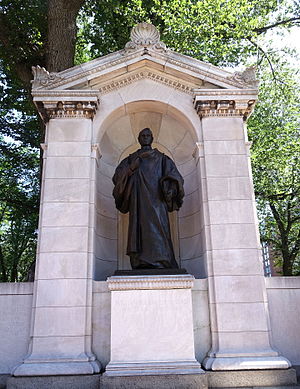
William Ellery Channing was the foremost Unitarian preacher in the United States in the early nineteenth century and, along with Andrews Norton (1786–1853), one of Unitarianism's leading theologians. Channing was known for his articulate and impassioned sermons and public speeches, and as a prominent thinker in the liberal theology of the day. His religion and thought were among the chief influences on the New England Transcendentalists although he never countenanced their views, which he saw as extreme. He espoused, especially in his "Baltimore Sermon" of May 5, 1819, given at the ordination of the theologian and educator Jared Sparks (1789–1866) as the first minister of the newly organized First Independent Church of Baltimore, the principles and tenets of the developing philosophy and theology of Unitarianism, leading to the organization in 1825 of the first Unitarian denomination in America and the later developments and mergers between Unitarians and Universalists, resulting finally in the Unitarian Universalist Association of America in 1961.
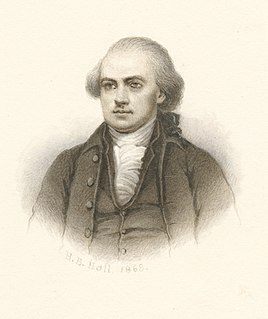
William Ellery was a signer of the United States Declaration of Independence as a representative of Rhode Island. In 1764, the Baptists consulted with Ellery and Congregationalist Reverend Ezra Stiles on writing a charter for the college that became Brown University. Ellery and Stiles attempted to give control of the college to the Congregationalists, but the Baptists withdrew the petition until it was rewritten to assure Baptist control. Neither Ellery nor Stiles accepted appointment to the reserved Congregationalist seats on the board of trustees.
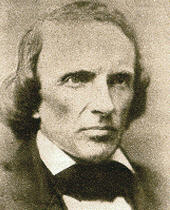
William Henry Channing was an American Unitarian clergyman, writer and philosopher.

William Ellery Channing was an American Transcendentalist poet, nephew of the Unitarian preacher Dr. William Ellery Channing. The younger Ellery Channing was thought brilliant but undisciplined by many of his contemporaries. Amos Bronson Alcott famously said of him in 1871, "Whim, thy name is Channing." Nevertheless, the Transcendentalists thought his poetry among the best of their group's literary products.

The Public Garden, also known as Boston Public Garden, is a large park in the heart of Boston, Massachusetts, adjacent to Boston Common. It is a part of the Emerald Necklace system of parks, and is bounded by Charles Street and Boston Common to the east, Beacon Street to the north, Arlington Street and Back Bay to the west, and Boylston Street to the south. The Public Garden was the first public botanical garden in America.
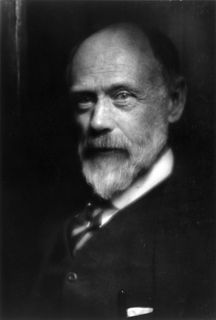
Samuel Herbert Adams was an American sculptor.
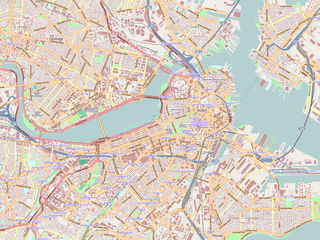
The Arlington Street Church is a Unitarian Universalist church across from the Public Garden in Boston, Massachusetts. Because of its geographic prominence and the notable ministers who have served the congregation, the church is considered to be among the most historically important in American Unitarianism and Unitarian Universalism. Completed in 1861, it was designed by Arthur Gilman and Gridley James Fox Bryant to resemble James Gibbs' St. Martin-in-the-Fields in London. The main sanctuary space has 16 large-scale stained-glass windows installed by Tiffany Studios from 1899 to 1929.
Charles Timothy Brooks was a noted American translator of German works, a poet, Transcendentalist and a Unitarian pastor.
William Ellery Leonard was an American poet, playwright, translator, and literary scholar.
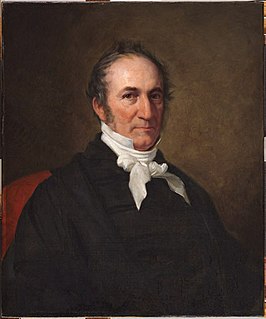
Edward Tyrrel Channing was an American rhetorician. He was a professor at Harvard College, brother to William Ellery Channing and Walter Channing, and cousin of Richard Henry Dana, Sr.

Channing School is an independent day school for girls at Highgate Hill in Highgate, North London. Channing School is a member of the Girls' Schools Association. The junior school is for pupils aged four to eleven and includes the Early Years Foundation Stage (EYFS).
William Stedman was a U.S. Representative from Massachusetts.
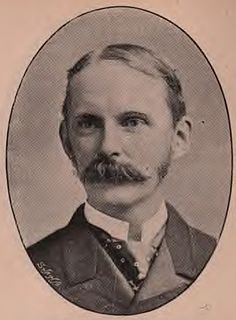
Francis Allston Channing, 1st Baron Channing, known as Sir Francis Channing, Bt, between 1906 and 1912, was an American-born British barrister, academic, and Liberal Party politician.
Walter Channing was an American physician and professor of medicine. He was the brother of preacher William Ellery Channing and of fellow Harvard professor, Edward Tyrrel Channing. He was also the father of the poet William Ellery Channing. He was married to Eliza Wainwright Channing from 1831 until her death in 1834.
Edward Strutt Abdy (1791–1846) was an English legal academic and abolitionist, notable as an author on racism and race relations in the United States.
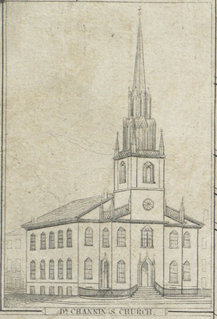
The Federal Street Church was a congregational unitarian church in Boston, Massachusetts. Organized in 1727, the originally presbyterian congregation changed in 1786 to "Congregationalism", then adopted the liberal theology of its fifth Senior Minister, William Ellery Channing, (1780–1842). For most of the 18th century the church was known as the Long Lane Meeting-House. In 1788, state leaders met in the relatively spacious building to determine Massachusetts' ratification of the United States Constitution. Thereafter the church renamed itself the Federal Street Church in honor of the event. In 1803, it called William Ellery Channing, (1780–1842), as its minister who defined "Unitarian Christianity" and launched the Unitarian movement, making the Federal Street Church one of the first to define itself as Unitarian.
Noah Worcester was a Unitarian clergyman and a seminal figure in the history of American pacifism.
Jonathan Remington (1677–1745), was an Associate Justice of Massachusetts Superior Court of Judicature appointed by Gov. Jonathan Belcher. Judge Remington married Lucy Remington Bradstreet (1680–1743), a granddaughter of Gov. Simon Bradstreet. Their daughter Ann Remington was the first wife of William Ellery, a signer of the United States Declaration of Independence.

Grace Ellery Channing was a writer and poet who published often in The Land of Sunshine.

William Francis Channing was an American activist, electrical researcher, scientist, physician, and inventor. He invented the first citywide electric fire alarm system. Channing worked with Alexander Graham Bell in developing the telephone.
